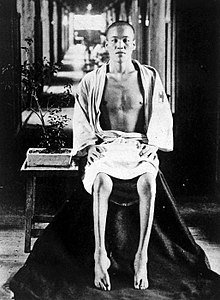Beriberi
Beriberi (also called vitamin B1 deficiency) is a disease of the nervous system. It happens when a person does not get enough thiamine (vitamin B1) in their diet.
Thiamine helps the body turn food into energy. People need thiamine for good brain function and a healthy liver, skin, hair, and eyes. It also helps the nervous system work properly.[1]
Without enough thiamine, a person’s body cannot create all the energy the person needs. As a result, people with beriberi have severe lethargy and feel exhausted. Beriberi can also cause muscles to get weaker. These symptoms can make it hard for a person to do simple things.[2]

Some people with beriberi have heart problems or even die.[2] Beriberi can also cause problems with the gastrointestinal system.
Most people get enough vitamin B1 in their regular diet. However, some groups are more likely to get beriberi. These include people who drink a lot of alcohol[2] and people who eat an unhealthy or unbalanced diet, like a diet of mostly white rice. [2] [3]
There are two kinds of beriberi: wet and dry. Wet beriberi mainly affects the cardiovascular system.[3] Dry beriberi affects the nervous system.[3] There is also a rare type of genetic beriberi.[3]
Most of the time, dry beriberi and wet beriberi happen at the same time in the same person. When this takes place, the victim is likely to only get the symptoms of one beriberi.[4]
- Difficulty in walking
- Loss of feelings in the hands and feet
- Loss of movement in the legs
- Mental confusion
- Difficulty speaking
- Pain
- Vomiting
- Strange eye movements
- Tingling feelings on the skin
- Waking up short of breath
- Swelling of the legs
- Fast heart rate
- Fluid in the lungs
- The heart gets bigger
References
change- ↑ "Vitamin B1 (Thiamine)". Mount Sinai Health System. Retrieved 20 January 2022.
- ↑ 2.0 2.1 2.2 2.3 "Beriberi." World of Scientific Discovery. Gale, 2007. Student Resources in Context. Web. 22 Feb. 2016.
- ↑ 3.0 3.1 3.2 3.3 3.4 3.5 "Beriberi - PubMed Health". ncbi.nlm.nih.gov. 22 July 2010. Retrieved 23 May 2011.
- ↑ "Beriberi." Karen Ericson, RN. The Gale Encyclopedia of Neurological Disorders, Second Edition. Ed. Brigham Narins. Detroit: Gale, 2012. 2 vols.